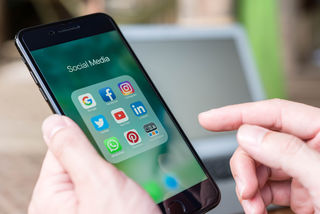Media
Is It Time to Declutter Your Social Media?
Using science—and Marie Kondo’s methods—can improve your well-being.
Posted September 24, 2019

Whether you love her or roll your eyes at any mention of her, Marie Kondo has identified a widespread problem and has offered some practical solutions. Her best-selling books and Netflix series have struck a chord with many Americans: We are drowning in a sea of stuff and it is affecting our well-being and happiness.
But we might be in even deeper water with our social media, which has taken over much of our digital lives. The American Psychiatric Association’s recent survey found that 38% of adults report social media being harmful to their mental health and an additional 45% report some negative effects. Only 5% of people think that social media has only positive effects. Research shows that social media use is related to loneliness in adults and adolescents; and also is related to depression, lower self-esteem, and social anxiety.
How can we reduce these negative effects and increase the positives? One way is a deliberate decluttering of our social media space. Some of Marie Kondo’s suggestions are consistent with psychological science and can be readily applied:
1. Ask yourself: “Does it bring me joy?”
Take a weekend morning to look through your contacts on the social networking platforms you use. If you have many contacts, it might take several mornings. Ask yourself whether a person’s or an organization’s posts generally are meaningful to you, and whether they lead to positive feelings. Also notice whether you engage actively with that contact.
A 2014 experimental study of 689,003 Facebook users showed that people who were exposed to more negative content were more likely to post in a negative direction. This and subsequent research using Twitter proved that “emotion contagion” can happen digitally. We are affected by the company we keep in person, but also virtually. So, figure out which of your contacts are sources of stress and negativity and get ready to purge.
2. Tackle categories instead of platforms.
Kondo advises decluttering by category rather than by room. One would, for example, purge papers, then clothes, etc. You could, similarly, create categories of contacts: a) organizations you follow, b) contacts from early childhood, c) high-school acquaintances, d) college friends, e) work contacts, f) romantic contacts (former or potential ones), g) influencers, etc. Then, go systematically through each category and unfollow, mute, block, or unfriend people and organizations that just clutter your social media or leave you bored, annoyed, or angry.
Once you have decluttered your social media platforms, you can get in the habit of doing it as you go. For example, when you look at Instagram photos you might notice that an acquaintance is using her platform mainly to promote her artisanal soaps that you are not interested in. Now is the perfect time to unfollow her. Or while going through your Twitter feed, you realize that someone’s posts always take a turn toward the rude and confrontational. You can unfollow them then and there.
3. Organize your social media life.
Just as Kondo introduced that special way of folding your clothes that gives you a better sense of what you have and where it is, you can likewise improve the organization of your digital space. Here are some of the ways you can do this:
- Give your social network platform feedback about any ads or posts that are irrelevant or offensive to you.
- Unsubscribe from Facebook groups you are no longer interested in—for example, that “Terrible Twos” group, even though your kids are teenagers.
- Prioritize people in Facebook’s News Feed preferences so that you first see the posts you care about the most.
- Make social media less intrusive in your life. For example, set daily limits on Instagram, turn off phone notifications related to social media, or delete social media apps altogether (forcing you to use social media only on your computer). A recent study suggests that even batching smartphone notifications can lead to better mood, lower stress, and feeling more attentive and productive.
4. Keep nostalgia in check; it might be overrated anyway.
Konde is not a fan of nostalgia. For the rest of us who get misty-eyed when looking at a high school yearbook or a photo of our kindergarten class posted on Facebook, it is important to keep a couple of guidelines in mind. Do not stay in social media contact with people from your past who bullied you, made you feel bad, or just plain frustrated you. There is no need to be digital friends with your whole middle school class – especially if that was a very hard period in your life. If you are grateful that you got out of that small town or bad neighborhood you grew up in, don’t follow the local organizations (unless you are interested in getting involved or helping with something there). Most importantly, after a breakup, block, unfollow, or unfriend your ex. Now. Staying digitally connected impedes healing and moving on. You can always get in touch later, if you decide to be friends.
5. Realize that purging feels good. That will have a snowball effect.
You will be surprised at how much lighter and happier you feel when you start decluttering your digital life. Some of my clients noticed a dramatic decrease in envy and an increase in well-being and confidence after purging contacts who they felt were aggressively promoting the idealized versions of themselves on social media. This is consistent with a recent study suggesting that browsing others’ perfectly curated posts can lead to lower self-esteem and higher depression even when we know that the lives posted on social media are not the same as real lives. Remember: Just as an excess of possessions clutters our homes, an excess of social media can clutter our minds. Take time to prune.


